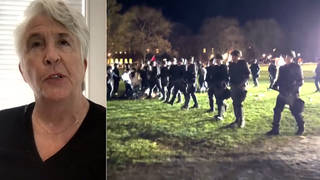
Related
Guests
- Ari Bermanjournalist and author of Minority Rule: The Right-Wing Attack on the Will of the People—and the Fight to Resist It.
We speak with journalist and author Ari Berman about his new book, Minority Rule, which details how the United States has since its founding privileged the rights and interests of a small elite over the needs of the majority. He outlines how, for the first time in U.S. history, five of six conservative justices on the Supreme Court were appointed by Republican presidents who lost the popular vote, and confirmed by senators elected by a minority of Americans. Berman says the court’s makeup is the product of two skewed institutions: how we elect our presidents through the Electoral College and how we appoint U.S. senators — both of which are flawed because they violate one person, one vote, violating the principle of equal representation, and empowering white, rural, conservative and wealthy citizens at the expense of more diverse and progressive parts of the country. “Our institutions are so antiquated, so undemocratic, that we need fundamental reform to change them, to democratize them,” Berman says.
Transcript
AMY GOODMAN: This is Democracy Now!, democracynow.org. I’m Amy Goodman.
As the Supreme Court hears oral arguments in cases ranging from a ban on emergency abortions in Idaho to whether former President Donald Trump is immune from prosecution, our next guest argues the Supreme Court is the product of minority rule. In his new book, journalist and author Ari Berman outlines how, for the first time in U.S. history, five of six conservative justices on the Supreme Court were appointed by Republican presidents who lost the popular vote, and confirmed by senators elected by a minority of Americans. Ari Berman says the court’s makeup is the product of two skewed institutions: how we elect our presidents through the Electoral College and how we appoint U.S. senators — both of which are flawed because they both violate one person, one vote.
Ari Berman joins us now in our New York studio. His new book is called Minority Rule: The Right-Wing Attack on the Will of the People — and the Fight to Resist It. He’s the voting rights correspondent for Mother Jones magazine, also author of Give Us The Ballot: The Modern Struggle for Voting Rights in America.
Welcome back to Democracy Now! It’s great to have you with us, Ari.
ARI BERMAN: So great to see you, Amy. Thank you.
AMY GOODMAN: Congratulations on the release of the book.
ARI BERMAN: Thank you.
AMY GOODMAN: Why don’t we start off with what happened this week, the oral arguments on whether Trump has immunity as president of the United States?
ARI BERMAN: Well, it was a new low even for this Supreme Court, because it showed the extent that they are willing to enable Donald Trump’s authoritarianism and rig the political process for Republicans. First off, you have to step back and realize how they took this case, right? They waited so long to take the case that they made it basically impossible for there to be a trial on Trump inciting the insurrection before the election. So, that, in and of itself, was a huge victory for Donald Trump. And then, when you got to the oral arguments themselves, I mean, it was stunning, some of the stuff they were saying. They basically ignored the entire history of the insurrection. And they seemed more concerned about a president being prosecuted for something than a president inciting the insurrection. So, Samuel Alito says this could be destabilizing to democracy if a president is prosecuted. What was destabilizing to democracy, Amy, was the effort to overturn the election and the insurrection at the Capitol. So it showed that the Supreme Court is a deeply, deeply undemocratic institution, and they will go to nearly any lengths to ensure that Republicans can win elections and that Donald Trump’s authoritarianism will be allowed to go forward.
AMY GOODMAN: And talk more about presidential immunity, what it means.
ARI BERMAN: What it means is that a president can do anything, basically, in office and can’t be held accountable for it. I mean, they said very clearly the president could order the assassination of someone, and unless he is impeached by the Senate, he can get away with it. So, remember when Trump said, “I could kill someone on Fifth Avenue and get away with it”? Basically, that’s what they were arguing before the Supreme Court.
I mean, it was so incredible just how the Supreme Court was downplaying the most authoritarian act in modern American history and basically saying there should be no legal consequences for this, and that not only will there be no legal consequences, but voters won’t even get to hear the evidence against Donald Trump that has been amassed by special prosecutor Jack Smith before the election. We’re facing a situation where unless the voters themselves decide not to elect Donald Trump, there will be no accountability through the legal process for inciting an insurrection at the Capitol. That is just absolutely stunning.
AMY GOODMAN: I’m wondering if you then can talk about the current Supreme Court, how it’s made up and how it illustrates your major thesis in your new book, Minority Rule.
ARI BERMAN: So, the major thesis of my new book is that a shrinking conservative white minority has rigged the political process in favor of an extreme faction of the Republican Party, basically to prevent a much more broader and more diverse majority from taking power. And the Supreme Court is a perfect illustration of that, because it is the product of two anti-democratic institutions. It’s a product of presidents, Republican presidents, who lost the popular vote, and it’s a product of conservative senators, who don’t — represent a minority of Americans, appointing the conservative justices. So, we have a — the way we elect presidents violates one person, one vote. The way we elect senators violates one person, one vote. That has led to a rigged Supreme Court.
Then the rigged Supreme Court themselves has further rigged the political process to benefit Republicans through things like gutting the Voting Rights Act, allowing dark money through Citizens United, and also issuing decisions that are at odds with the majority of Americans, overturning Roe v. Wade, overturning gun control, overturning environmental protections. So, a product of minority rule has then deepened minority rule in the U.S. And basically, Republicans have used the courts, and particularly the Supreme Court, to do all these unpopular things, because they know they can’t win on them otherwise.
AMY GOODMAN: Talk about the history, for example, the Constitutional Convention, why it is that states that are increasingly depopulated are represented by two senators in the same way that states that have millions more people still have the same two senators.
ARI BERMAN: What I wanted to do in the book was trace the crisis of democracy we face right now all the way back to the founding period and basically say that the Founding Fathers created democratic institutions that weren’t actually that democratic. And that laid the groundwork for the current crisis we have today, because by giving each senators the same number of representation — so each state gets two senators, no matter the representation — what that means then is that you have a situation where whiter, smaller, more rural states get far more representation than more diverse, more urban, more progressive states. And this has gotten dramatically worse over time, Amy. So, in 1790, after the Constitution was ratified, the country’s largest state, Virginia, had 12 times the population of the country’s smallest state, Delaware. Now California, the largest state, has 67 times the population of the smallest state, Wyoming. That basically means that the Senate ensures minority rule by allowing, essentially, a minority of conservative Americans to elect a majority of the Senate when Republicans are in control.
AMY GOODMAN: You quote John Adams in Minority Rule, saying, “If a majority were to control all branches of the government, debts would be abolished first, taxes laid heavy on the rich and not at all on the others, and at last, a downright equal vision of everything would be demanded and voted.”
ARI BERMAN: It just goes to show you that the founders were not chiefly interested in equality, or even, really, democracy. They were concerned with protecting the power of people like themselves, which was wealthy white landowners. And they created all of —
AMY GOODMAN: Male landowners.
ARI BERMAN: Exactly, wealthy white male landowners. And so, a majority of Americans were excluded from the country’s most important democratic document. Women, African Americans, Native Americans, even poor white people were excluded from these democratic institutions. And so, it’s a fundamental contradiction that the country’s most important democratic document, the Constitution, was actually intended, in many ways, to make the country less democratic.
AMY GOODMAN: Talk about, oh, countries [sic] like Delaware and the Constitutional Convention, and what they threatened, tiny countries, versus Virginia, a much larger — a much larger state.
ARI BERMAN: Yeah, states, larger states, yeah, exactly. This was fascinating to me when I went back and researched the history, because we have all these things that are called compromises, right? The idea that each state should have the same number of senators is called the “Great Compromise.” But it’s actually the great concession, because a lot of the architects of the Constitution, people like James Madison, hated the idea that each state would have the same number of senators. They wanted the Senate to be based on proportional representation. They wanted it to be an elite body, but they wanted it to represent the greatest number of Americans. And basically, the smaller states said, “If you don’t give us the same level of representation, we will leave the Union and find a foreign ally. We might rejoin England or join France.” So they basically held a gun to the head of the delegates and said, “Give us this power, or we won’t ratify the Constitution.” The same thing happened with the slave states, Amy, through the Three-Fifths Clause, so that the Southern states would have far more power in the House of Representatives and in the Electoral College.
So, what we see through the Constitution is that these smaller minority groups — not minority groups as we think of them in terms of voters of color, but small states, slave states — they basically had a huge advantage in the Constitution. And those undemocratic features, even as we’ve democratized since, have become pronounced in a way that they’re threatening representative government today.
AMY GOODMAN: Let me turn to Paul Weyrich, who’s described as the “founding father of the conservative movement,” speaking at a religious rights gathering in Dallas in 1980, 40 years ago.
PAUL WEYRICH: Now, many of our Christians have what I call the goo-goo syndrome — good government. They want everybody to vote. I don’t want everybody to vote. Elections are not won by a majority of people. They never have been from the beginning of our country, and they are not now. As a matter of fact, our leverage in the elections, quite candidly, goes up as the voting populace goes down.
AMY GOODMAN: The significance of what Paul Weyrich is saying?
ARI BERMAN: I mean, an incredible quote that just says the quiet part out loud and really lays out the strategy of the conservative movement, which is, when fewer people participate in democracy, it benefits the shrinking conservative white minority. And what I argue in the book is that there’s this historical anti-democratic institutions, but then there’s all these new anti-democratic tactics that are layered onto it, so things like voter suppression, election subversion, gerrymandering, the censoring of history — all of which is being used to maintain white power as the country is shifting demographically. And that’s what makes these anti-democratic tactics so dangerous.
AMY GOODMAN: Talk about the Electoral College.
ARI BERMAN: Well, just such a fundamentally undemocratic institution. I tried to explain the Electoral College recently to my 9-year-old daughter, and she looked at me like I was crazy. The idea that someone could get more votes but lose the election is just crazy for her, right? Or to anybody, when you explain it. And the Electoral College is also a fundamentally undemocratic institution. The founders did not trust the public to directly elect the president, so they created this incredibly undemocratic mechanism that would give elite white men the power to choose the president.
And it was fundamentally flawed from the start, because the Electoral College was a basis of how we elect our representatives, meaning that small states had more power because of the U.S. Senate, and slave states had more power because of the Three-Fifths Clause. So, the combined weight of the slave states and of the small states meant that for the beginning of our country, Amy, 10 of 12 U.S. presidents were slaveholders. Eighteen of the first 31 Supreme Court justices were slaveholders. And a majority of House speakers before the Civil War were slaveholders. So, it’s amazing. Basically, racism is baked in to the Constitution. I want people to understand that, because we venerate the Constitution as if it’s this godlike document, and we have to have a more realistic discussion over the founding of our country, that racism is built into our institutions. It remains a problem today. And our institutions are so antiquated, so undemocratic, that we need fundamental reform to change them, to democratize them.
AMY GOODMAN: Where does three-fifths fit into all of this?
ARI BERMAN: Well, what three-fifths meant is that African Americans were defined as three-fifths of a person. What that meant is that even though they were enslaved and disenfranchised in the South, the Southern states got more representation because of their enslaved population, which is incredible. And that was another thing. When they tried to get rid of that, the slave states basically said, “We won’t ratify the Constitution unless you give us this power.” What it meant is that the Southern states had a third more representation in the House of Representatives because of the Three-Fifths Clause than they would have had otherwise. That then warped the presidency, because what it meant is that the House of Representatives had the power with the Senate to determine the number of electoral votes. So, as I said, what it means is that slave states had a disproportionate amount of power both in the House of Representatives and in the Electoral College until the Civil War.
AMY GOODMAN: It makes me think about prisoners in many of the states in this country. For example, in New York, so many people of color taken from downstate upstate, and upstate they count as the population, increasing the population so they have more representation. But they can’t vote.
ARI BERMAN: Yeah, exactly. And prison gerrymandering and that kind of thing is just one example of the anti-democratic features that remain today. And so, what I want people to understand is that we need to reform these undemocratic institutions. We can’t just fight for the rights and freedoms we have today. We need broader reform to fully democratize this country in a way that we’ve never done.
AMY GOODMAN: And that is the final part of your title, And the Fight to Resist It. Can you talk about the National Popular Vote Interstate Compact? I mean, Maine just joined. We’re at what? There’s 207 now, representing 207 votes, going to 270, and the whole thing changes.
ARI BERMAN: Exactly.
AMY GOODMAN: Explain what that is.
ARI BERMAN: The idea is that if states that would add up to 270 Electoral College votes, which is what you need to win the presidency, would pledge to appoint their electors to the popular vote, that would then abolish the Electoral College. Now, I’m sure the conservative Supreme Court would want to weigh in on this, but it’s a mechanism to do an end-around around amending the Constitution, because the Constitution is so difficult to amend.
And what I talk about in the book is, as you say, the fightback and this long push and pull between democratic and anti-democratic forces throughout American history. And we’re at another major tipping point today, where there’s forces that are trying to constrict American democracy, and there’s forces that are trying to expand American democracy. And that’s really the choice facing the country right now, is: Which way are we going to go?
AMY GOODMAN: Where does Trump and Project 2025 fit into this?
ARI BERMAN: Well, Project 2025 is basically the project for Trump’s second term. And what it does is it’s trying to enshrine Trump’s authoritarianism and make it part of the entire fabric of the federal government. And that’s why I want people to understand Trump has a plan for 2024 that is far more radical and far more dangerous than what he entered in to 2016, because the entire conservative movement has now endorsed Donald Trump’s authoritarianism. So we should listen to what he has to say. He has a plan to make minority rule impossible to reverse. People take democracy for granted. And I want them to understand: If Donald Trump gets back in office and implements his authoritarian agenda, it could be very difficult, if not impossible, to reverse that.
AMY GOODMAN: Trump has made unfounded claims that Democrats are helping undocumented immigrants sign up to illegally vote in the presidential election. This is Trump speaking earlier this year.
DONALD TRUMP: I believe now that that’s why they’re allowing these people to come in, people that don’t speak our language. They’re signing them up to vote. And I believe that’s why you’re having millions of people pour into our country. And it could very well affect the next election, and I believe that’s why they’re doing it.
AMY GOODMAN: Your response, Ari Berman?
ARI BERMAN: Well, it’s a total lie. I mean, it’s another total falsehood by the president. First off, migrants are not crossing the border illegally to vote for Democrats. Secondly, it’s illegal for them to do so. And there’s built-in checks and balances in our voting system to prevent people from voting illegally.
But what he’s trying to do is he is trying to use these scare tactics to preserve white power, and he’s demonizing immigration to try to make the country more white. And he’s also trying to make it harder to vote by demonizing immigrants to benefit Republicans. And what I argue is, so much of the Republican push for minority rule today is about the fear of a majority-minority future, in which white people will no longer be the majority of the country by 2045. And I think that’s motivating Trump and the conservative movement to basically build a fortress to stop what they view as the coming siege.
AMY GOODMAN: What most shocked you in your years of research for this book, Minority Rule?
ARI BERMAN: Just the extent to which the crisis of democracy is so much bigger than Donald Trump. I think a lot of people think that Trump is an unprecedented threat, and in many ways he is. He is an accelerant to an undemocratic political system, but he’s also a product of an undemocratic political system. And that’s why I talk about the undemocratic aspects of the Constitution. That’s why I talk about the violent backlash to multiracial democracy during Reconstruction, because there are precedents for Donald Trump. He didn’t just come out of nowhere. He is an authoritarian leader that benefits from a deeply undemocratic political system. And that’s why we need to change the political system itself, if we want to prevent more Trumps in the future.
AMY GOODMAN: What are the most promising resistance movements to this that you see?
ARI BERMAN: I think the most promising resistance movements right now are at the state level in places like Michigan, where people are using direct democracy to expand rights and to fight a rigged political system, where they’re doing things like ending partisan gerrymandering, expanding voting rights, enshrining abortion access. It’s very easy to get dismayed at what’s happening at the federal level and feel like it’s impossible to change it. But you look at Michigan, you look at Wisconsin. A lot of really interesting things are happening at the state level, where the push for minority rule has led to an equally fierce push for majority rule. And the forces that are trying to rig American democracy have led to a broader pro-democracy movement to protect it.
AMY GOODMAN: Ari Berman, I want to thank you so much for being with us. I know you’ll be at the Brooklyn Public Library speaking with Chris Hayes on Monday night and going around the country with your book. Journalist and author Ari Berman, his new book, Minority Rule: The Right-Wing Attack on the Will of the People — and the Fight to Resist It, voting rights correspondent for Mother Jones magazine. I’m Amy Goodman. Thanks so much for joining us.












Media Options